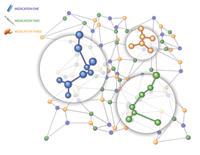Bioregulatory Clinical Pharmacology
A fundamental principle of bioregulatory clinical pharmacology is the ability of medications to act on multiple targets in disease-related networks simultaneously. BrSM focuses on using interventions to support the body’s own regulation mechanisms.
BrSM considers four fundamental advantages of a multitarget strategy over a single-molecule, single-target strategy:
- Synergistic (combinatorial) effects target a wider range of information flow in disease-related biological networks;
- Modest modulation allows for more efficient control of biological networks;
- Lower concentrations ensure higher safety;
- Drug resistance is less probable.
The mode of action and efficacy of medications with bioregulatory properties are determined by natural additive or synergistic effects of their components.
Synergistic strategies are much more comprehensive and complementary, and broader in scope of effects than are single-molecule drugs. As such, combination medications are well suited for the BrSM approach. Biological information of regulatory networks can be purposefully influenced with multitarget, multicomponent molecular combinations.
When medications are of natural origin, their functions are determined by natural combination chemistry and synergy. In some cases, the known active ingredients are potentiated by other components, whereas in other cases they may reduce the toxicity of the active ingredient. Some authors argue that “natural” products are particularly effective because their multicomponent nature utilizes complex and diversified strategies to combat disease progression. When multiple independent targets of the same pathway are inhibited simultaneously, a mild inhibition of each target is sufficient to achieve a much larger therapeutic window and a therapeutically relevant effect. The concurrent and gentle use of more than one natural substance may offer a safe and effective alternative to the current medical paradigm.

Bioregulatory Clinical Pharmacology.
A fundamental postulation of Bioregulatory Systems Medicine is that medications with bioregulatory properties facilitate autoregulation by acting on multiple targets (nodes) in disease-perturbed networks simultaneously. In this way, biological information flow can be directly and purposefully influenced. The efficacy of this multitarget mode of action is determined by the ability to reverse the clinical picture of disease.
